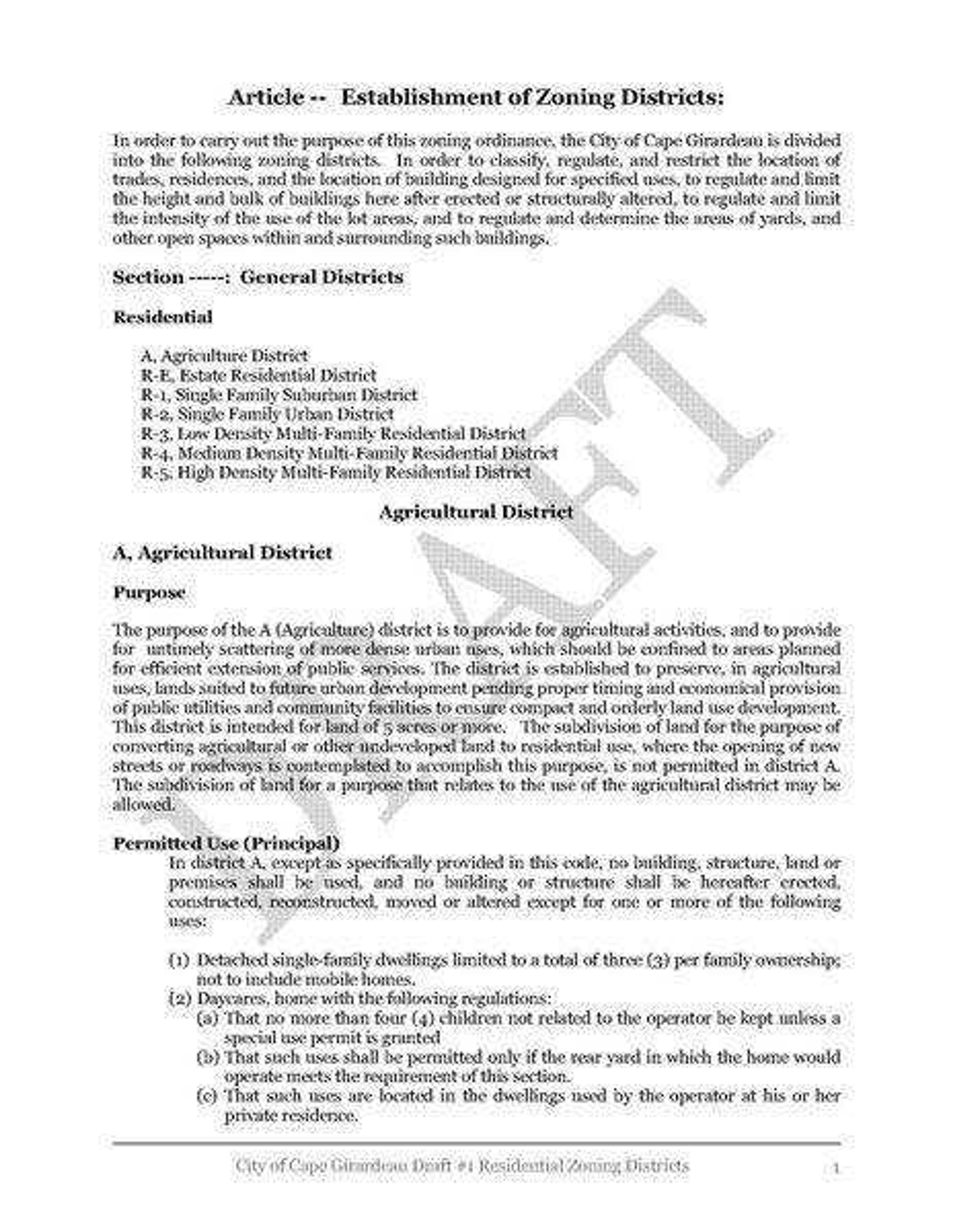Planning and zoning board to discuss limits on number of people who can share housing
Cape Girardeau is rewriting its zoning code and proposed new rules for residential areas could sharply curtail the number of people who can share a house or apartment. The residential code will be part of a Planning & Zoning Commission meeting at 7 p.m. ...
Cape Girardeau is rewriting its zoning code and proposed new rules for residential areas could sharply curtail the number of people who can share a house or apartment.
The residential code will be part of a Planning & Zoning Commission meeting at 7 p.m. Wednesday at city hall that is billed as public participation, not a public hearing, because there are months of work ahead on all aspects of the zoning code, said Sarah Wallace, community planner for the city. To attract attention to the meeting, the city sent out notices to several groups, including the Cape Girardeau Chamber of Commerce and Old Town Cape, as well as a list of 69 construction companies and land developers.
But the group of eight landlords who met with city officials last July over the issue of roomers, or extra people sharing a rental unit, didn't get a notice, landlords contacted Monday said. And the draft law, as written, eliminates all mention of roomers.
"I don't think it was intentional not to notify them," Wallace said Monday. "We were hoping the information would be out there, because many of them are involved in these local groups. We had no intention of purposely excluding them in any way."
But two landlords contacted said they don't understand why, when the number of people who can rent from them is vital to their livelihood, the city didn't send notices to them directly as occurred with other interested parties.
"It tells you exactly the message they are sending," said Jason Coalter, who owns about 100 rental properties, mostly in south-central sections of the city. "They couldn't tell us a reason why roomers are a legitimate issue, but they are trying to put something through anyway."
And Robb Bartlett, a landlord who owns property adjoining the university that could become part of a proposed Boulevard Historic District, said he feels deliberately snubbed. "I am in shock by this," he said. "It just doesn't seem right we didn't get the letter that they sent to everyone else."
Under the current city zoning code, a housing unit may be rented to a family group where everyone is related by blood or marriage, a cohabitating couple with their children and dependents, or three unrelated people. In addition, there may be two additional "roomers" in a housing unit located in an R-1 or R-2 zone and four additional roomers in a single-family home in an R-3 area. In an R-4 zone, there may be as many as four roomers in an apartment in addition to the family unit.
In practical terms, it means up to five unrelated people may live in districts zoned for single-family homes, up to seven unrelated people in an area set aside for single family homes and duplexes and up to seven in areas designated for apartments.
The city code also allows one extra roomer in R-1 and R-2 areas for each separate "cooking facility" available in addition to the main kitchen area.
The push to limit occupancy of rental homes in single-family areas began last year as complaints mounted about homes being converted from owner-occupied units to rental properties. Those complaining were concerned with lack of parking and noise from college students' parties. The need for student rental property has been increasing as enrollment rises at Southeast Missouri State University. Enrollment at the beginning of the year was 35 percent higher than 1994.
Another part of the proposed new zoning law is a university overlay district, where single-family homes would be allowed to have one occupant for each bedroom in the home as long as there was off-street parking.
The draft up for discussion Wednesday evening is just that, Wallace said. It is a starting point for discussions that could last throughout the year as staff moves methodically through the zoning code. Action will come only after the zoning rules are completely rewritten, she said.
"It is a long process, an in-depth process," Wallace said. "We are just trying to get to that starting point."
But Coalter, who said he has 30 to 40 properties with four or more bedrooms, said he will be on hand Wednesday to let the commission know he would not be able to afford the rehabilitation investments he has made if tight restrictions are imposed.
"If you pass this ordinance and it is blanket across the city, it will do more harm than good," Coalter said.
rkeller@semissourian.com
388-3642
Does this affect you?
Have a comment?
Log on to semissourian.com
Connect with the Southeast Missourian Newsroom:
For corrections to this story or other insights for the editor, click here. To submit a letter to the editor, click here. To learn about the Southeast Missourian’s AI Policy, click here.










